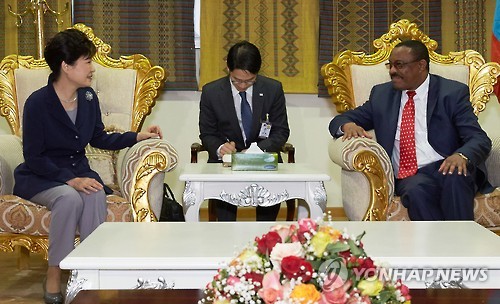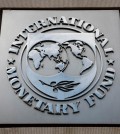- California Assembly OKs highest minimum wage in nation
- S. Korea unveils first graphic cigarette warnings
- US joins with South Korea, Japan in bid to deter North Korea
- LPGA golfer Chun In-gee finally back in action
- S. Korea won’t be top seed in final World Cup qualification round
- US men’s soccer misses 2nd straight Olympics
- US back on track in qualifying with 4-0 win over Guatemala
- High-intensity workout injuries spawn cottage industry
- CDC expands range of Zika mosquitoes into parts of Northeast
- Who knew? ‘The Walking Dead’ is helping families connect
Park to hold talks with Ethiopian PM on bilateral ties

South Korean President Park Geun-hye (L) talks with Ethiopia`s Prime Minister Hailemariam Desalegn after arriving at Addis Ababa Bole International Airport in Ethiopia on May 25, 2016, to hold summit talks with Ethiopia`s President Mulatu Teshome. Park is scheduled to visit Ethiopia, Uganda, Kenya and France before returning to Seoul on June 5.
ADDIS ABABA, (Yonhap) — South Korea and Ethiopia are set to sign dozens of initial deals on Thursday that could further boost their political and economic ties as their leaders prepare to hold talks later in the day.
President Park Geun-hye and Ethiopian Prime Minister Hailemariam Desalegn are expected to observe the signing of some 40 memorandums of understanding (MOUs) after their summit.
At the talks, the two leaders are expected to discuss a wide-range of issues, including trade, investment, development cooperation and climate change as well as peacekeeping and North Korea’s nuclear weapons programs, a senior South Korean official said, He asked not to be identified, citing policy.
The state visit comes as South Korea is seeking to boost political and economic ties with Africa, which has emerged as a continent of opportunity in recent years.
The MOUs call for, among other things, South Korea’s provision for a US$500 million loan to Ethiopia from 2016 to 2018, a move that Seoul says will help South Korean companies make inroads into Northeast African country’s market.
The country — five times the size of the Korean Peninsula — is pushing to modernize its roads, electricity and other infrastructure. South Korean companies are seeking to participate in a high-way and other projects worth about $690 million.
Ethiopia is pushing to create a textile industrial complex for South Korean companies in Adama, a city in central Ethiopia. It is also considering a move to offer tax benefits to South Korean textile companies to attract investment.
South Korea said its textile companies can export intermediate goods that can be made into finished products in Ethiopia. These goods can be shipped to the United States and the European Union without tariffs, a move that could offer a competitive edge to South Korean companies.
South Korea and Ethiopia are expected to sign a double taxation avoidance pact that could facilitate South Korean companies’ investments in Ethiopia as the deal could reduce tax burden on South Korean companies.
Meanwhile, the two countries are expected to agree to hold regular consultations on bilateral and multilateral issues.
South Korea also said it could sign a deal with Ethiopia to pursue defense cooperation and to prevent the country from building up military cooperation with North Korea again.
The summit could help South Korea secure cooperation from African countries in faithful enforcement of the toughest U.N. sanctions imposed on North Korea over its fourth nuclear test and long-range rocket launch earlier this year, the South Korean official said.
Ethiopia has maintained its clear opposition to North Korea’s nuclear test.
Seoul said it shares a special affinity with Ethiopia over the African country’s contribution of more than 6,000 troops to help defend South Korea in the 1950-53 Korean War.
The war ended with a cease-fire agreement, not a peace treaty, leaving South and North Korea technically at war.
Also Thursday, Park is set to meet with President Mulatu Teshome before attending a state banquet to be hosted by Hailemariam.
Ethiopia is the first stop on Park’s swing through Africa. The trip is set to take her to Kampala and Nairobi for talks with Uganda’s president, Yoweri Museveni, and Kenyan President Uhuru Kenyatta.











